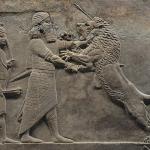The late Steve Hays was a Protestant Reformed, anti-Catholic apologist, very active online, who ran the site, Triablogue. In this series of articles, I will be critiquing many portions of a collection of his entitled “Annotated prooftexts [for Calvinism]” (7-7-14). Hays writes in his introductory section:
I’m going to quote a number of Reformed prooftexts, in canonical order, then quote interpretive comments by various scholars. . . . Taken by themselves, Reformed prooftexts might seem to beg the question by presupposing a Reformed interpretation thereof. . . . I’ve gone beyond bare prooftexting to provide exegetical arguments for the Reformed interpretation. . . .
Although both Calvinists and Arminians have their one-verse prooftexts, Reformed theological method is based less on snappy one-liners than tracing out the flow of argument or narrative arc in larger blocks of Scripture (e.g. Gen 37-50; Exod 4-14; Isa 40-48; Jn 6, 10-12, 17; Rom 9-11; Eph 1-2, 4).
Hays utilizes the English Standard Version (ESV) of the Bible, which was produced by over one hundred evangelical Protestant scholars, and follows the literary tradition of the KJV and especially the RSV. When I cite additional Scripture in my replies, it will be the RSV version.
*****
2 Sam 17:14
And Absalom and all the men of Israel said, “The counsel of Hushai the Archite is better than the counsel of Ahithophel.” For the Lord had ordained to defeat the good counsel of Ahithophel, so that the Lord might bring harm upon Absalom.
The Lord answered David’s prayer (cf. 2 Sam 15:31). The narrator’s description of Ahithophel’s advice as “good,” in contradistinction to Hushai’s characterization of it as “not good” (17:7), reminds the reader that Absalom is a victim of divine deception (see the comment above on 16:18).
There is more to the story than meets the eye. Indeed, as we read the advice of the two counselors, it is quite apparent that Ahithophel’s plan is superior; even the narrator admits this (17:14). But in the end the Lord is manipulating the minds of Absalom and his men, causing them to prefer the desperate, inferior plan offered by Hushai, because he has already determined to bring disaster upon Absalom (17:14). This is reminiscent of the account of Eli’s sons, who rejected their father’s warning because the Lord had by that time decided to kill them (1 Sam 2:25; see as well 1 Kings 12:15). R. Chisholm, 1 & 2 Samuel (Baker 2013), 268,270.
I dealt with the question of Eli’s sons and what caused their rebellion (God or themselves) last time. The full scriptural data regarding them does not support Calvinism and double predestination. Now we have a similar consideration. All agree that Absalom was judged by God. The question under dispute is whether he was 1) judged due to his own freely chosen sin and rebellion, or 2) foreordained from all eternity to be judged and condemned to hell for doing (without free will) what he could not possibly refuse to do: it having been predetermined beforehand by God’s eternal decree.
Now, as always, I will be looking to see what the Bible has to say about this question, rather than accepting a preconceived theology (five-point Calvinism) and trying to fit the scriptural “round peg” into the “square hole” of the late, novel, false doctrine (in many but not all respects) of Calvinism. Calvinists are quick to accuse others of “reading into” the Bible their false doctrines (eisegesis); but I submit that they do plenty of this themselves. I have no problem demonstrating these sad tendencies again and again, in my many critiques of unbiblical doctrines required by Calvinism.
Commentator Chisholm states that “the Lord . . . has already determined to bring disaster upon Absalom.” All parties agree on that. The question is when did He determine that and why. The Calvinist answers, “from all eternity” and “out of the inscrutability of His just eternal decrees that we can never fully comprehend.” The Arminian Protestant, Catholic, and Orthodox answers, “God determined to judge him after he freely chose of his own free will to reject Him and righteousness. God knew from all eternity what Absalom was going to do, but He didn’t foreordain or cause it.” Which of these two diametrically opposed views does the Bible actually verify and support? Well, that’s what we will examine.
In order to do this, we have to examine what the Bible states about Absalom. He basically was guilty of jealousy of his father David’s power. He had to have it himself:
2 Samuel 15:4-6, 10, 12-13 Ab’salom said moreover, “Oh that I were judge in the land! Then every man with a suit or cause might come to me, and I would give him justice.” [5] And whenever a man came near to do obeisance to him, he would put out his hand, and take hold of him, and kiss him. [6] Thus Ab’salom did to all of Israel who came to the king for judgment; so Ab’salom stole the hearts of the men of Israel. . . . [10] . . . Ab’salom sent secret messengers throughout all the tribes of Israel, saying, “As soon as you hear the sound of the trumpet, then say, `Ab’salom is king at Hebron!'” . . . [12] . . . And the conspiracy grew strong, and the people with Ab’salom kept increasing. [13] And a messenger came to David, saying, “The hearts of the men of Israel have gone after Ab’salom.”
2 Samuel 15:31 And it was told David, “Ahith’ophel is among the conspirators with Ab’salom.” And David said, “O LORD, I pray thee, turn the counsel of Ahith’ophel into foolishness.”
God can certainly influence people’s minds for the sake of His will. Proverbs 16:9 states: “A man’s mind plans his way, but the LORD directs his steps.” But we have no undeniable, compelling biblical reason to believe that God both caused Absalom’s defection and judged what He Himself had foreordained. Absalom chose to rebel. It was a result of that, that God turned against and judged Him. Romans 1 enlightens us as to the proper chronological order of these sorts of things:
Romans 1:18, 21-26, 28 For the wrath of God is revealed from heaven against all ungodliness and wickedness of men who by their wickedness suppress the truth. . . . [21] for although they knew God they did not honor him as God or give thanks to him, but they became futile in their thinking and their senseless minds were darkened. [22] Claiming to be wise, they became fools, [23] and exchanged the glory of the immortal God for images resembling mortal man or birds or animals or reptiles. [24] Therefore God gave them up in the lusts of their hearts to impurity, to the dishonoring of their bodies among themselves, [25] because they exchanged the truth about God for a lie and worshiped and served the creature rather than the Creator, who is blessed for ever! Amen. [26] For this reason God gave them up to dishonorable passions. Their women exchanged natural relations for unnatural, . . . [28] And since they did not see fit to acknowledge God, God gave them up to a base mind and to improper conduct.
Calvinism is wildly inconsistent with this entire passage. For example, by Calvinist reasoning, Romans 1:28 should actually read: “God gave them up [from all eternity] to a base mind and to improper conduct, so that they would not see fit to acknowledge God.” The ultimate cause would lie with God, rather than Absalom. But St. Paul stresses no less than four times in this passage that God “gave them up” because of their free choice of rebellious, sinful behavior: “Therefore God gave them up” (1:24), “because they . . .” (1:25), “For this reason God gave them up . . .” (1:26), “since they did not see fit . . .” (1:28). Paul explains very clearly why God does this. It’s in response to the sin of man.
Calvinism, on the other hand, would place all this squarely on God, Who planned these sins from all eternity and judged what He Himself had planned. They would say we can’t understand why He would make such inexplicable decrees, whereas Paul assumes it is completely understandable and able to be explained (which he proceeds to do). The Calvinist take is equal parts radically unbiblical, blasphemous, and ridiculous. It’s utterly contrary to what St. Paul teaches. If the choice is the Apostle Paul vs. Calvin and Calvinists, obviously we must choose the former.
***
*
*
***
Photo credit: Death of Absalom (1762), by Corrado Giaquinto (1703-1766) [public domain / Wikimedia Commons]
***
Summary: Calvinists futilely use 2 Samuel 7:14: “the Lord had ordained to . . . bring harm upon Absalom” to argue that he didn’t freely rebel and cause this divine determination.
***














